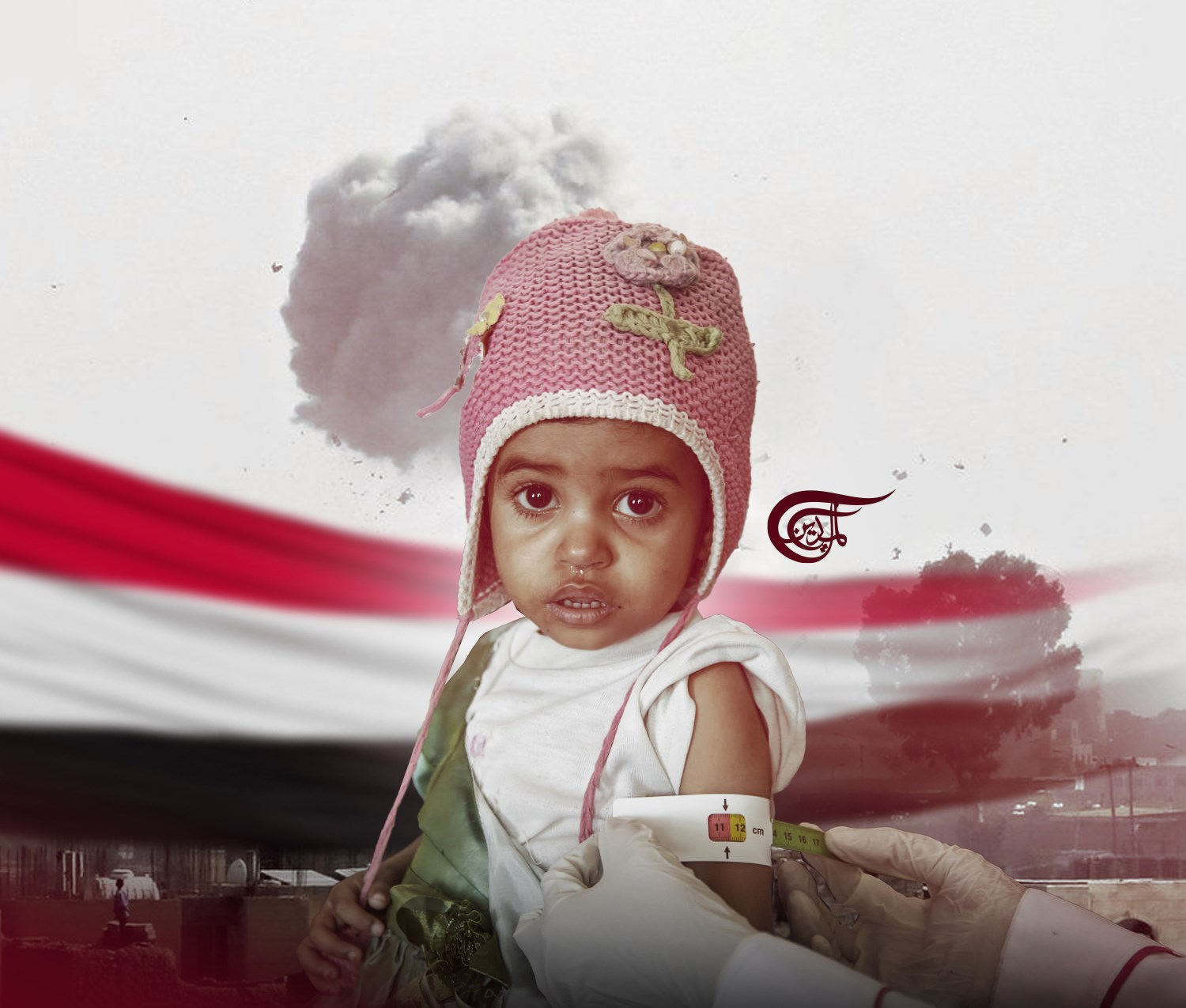Death of 10 leukemia-stricken children put the spotlight on US-Saudi blockade on Yemen
Eight out of the nine children who were seriously ill have recovered, according to the Health Minister amid calls for lifting the US-backed Saudi blockade on the entry of drugs including those for cancer patients.
-

Death of 10 leukemia-stricken children put the spotlight on US-Saudi blockade on Yemen
At Al-Kuwait Hospital in Sanaa, where 19 children with leukemia were injected with a "smuggled and contaminated" drug that resulted in the death of 10 children, Abdullah Ali Mahdi has been very vigilant about contraband drugs and used his own method, which saved the life of his five-year-old leukemia patient, Waleed.
“I bought all medicines from Egypt because Yemen is under blockade and most medicines are smuggled into Yemen,” 49-year-old Mahdi, father of Waleed, told Al Mayadeen English. “Without this method that saved my son's life, Waleed would have been one of those dead or seriously ill.”
-

Abdullah Ali Mahdi sits beside a medic who was treating his son Waleed, a leukemia patient, after Mahdi declined to have his pictures taken along with his son Waleed at the leukemia center on October 23, 2022 (Naseh Shaker/Al Mayadeen English)
Waleed is one of 1,539 children receiving treatment at the leukemia center of Al-Kuwait hospital, according to figures shown to Al Mayadeen English by Haitham, the admittance officer of the leukemia center.
The Ministry of Health said in a statement on October 13 that 19 leukemia-stricken children at Al-Kuwait hospital had received a "smuggled and contaminated" drug, causing the death of 10 children with the remaining 9 still receiving treatment.
Waleed’s father, Mahdi, says his son was diagnosed with leukemia in January 2022 and has been receiving treatment at this center for 10 months.
Some media sources say the smuggled drug is known as “Methotrexate”, which was manufactured in India by a company named Celon Labs. Al Mayadeen English sent the company a request for comment via email but did not respond as of the time of publishing this piece.
Al Mayadeen English met with the head of the Leukemia Unit at Al-Kuwait Hospital, Abdulrahman Al-Hadi, but he didn’t allow us to meet with the 9 other children still receiving treatment nor did they provide us with the contact details of the dead children’s parents at orders of the court looking into this case.
-

One room at Leukemia Center where 19 children were given contaminated drugs on October 23, 2022 (Naseh Shaker/Al Mayadeen English)
“Only two out of the nine children are still receiving treatment. Seven have recovered and are back home,” Al-Hadi told Al Mayadeen English. “If you want to interview parents of the dead children, you need permission from the court that is investigating the case.”
Al Mayadeen English contacted Yaser Al-Zendani, prosecutor of the Court for the Western Capital District of Sanaa, who declined to interview the parents because publishing their opinions “will affect the course of the trial.”
Case referred to court
In an interview for Al-Masirah TV, Taha Al-Mutawakel, Minister of Health, said on October 21 that he had formed a committee with members from the Supreme Medical Council, the Supreme Authority for Medicines, and the National Cancer Center headed by the Minister of Health to find out the truth about what happened in the leukemia center.
“We arrested the head of the Supreme Authority for Medicines and his deputy and referred them to the Attorney General on the grounds of failure to give full testimony, and the case is now in the court,” reported Al-Masirah, citing Al-Mutawakel.
Al-Mutawakel said after 15 days the laboratory analysis at the Supreme Authority for Medicines proved that the drug, methotrexate, was contaminated.
“19 children were injected with a dose of “methotrexate”, 10 children died, 8 cases improved, and one case is still in intensive care,” Al-Mutawakel said.
“I ask for a fair trial for all officials that smuggled the product and even those who didn’t play a role in preventing the injection of the 19 children,” said Mahdi while standing beside his son, Waleed, at the leukemia center receiving medicine he bought from Egypt.
Mahdi said he has been using the same product “methotrexate” for his son, but the one made in Germany and Egypt, not the Indian one that caused this tragedy in the hospital.
“We should consider a lawsuit against the Indian company, [Celon Labs] at the International Criminal Court, and WHO should play a vital role in supporting us,” Mahdi said. “If it was me, I would close this company.”
Saudi blockade, smuggling network
Amid the war on Yemen, the US-backed Saudi blockade on the country, including entry of some medicines, has created large smuggling networks, including drugs.
“The contaminated drug was smuggled into Yemen because Sanaa airport is under blockade,” explained Mahdi.
The Ministry of Health said it took measures when it received reports of the drug that caused complications for the children by testing it and found it was smuggled and contaminated.
The Ministry said in a statement it closed a pharmacy at Al-Zubairi Street without naming it. However, Al Mayadeen English looked into the name of the pharmacy and found out it was “New Pharma”, which was closed for selling the drug.
An employee at the New Pharma who asked to remain anonymous said the Pharmacy has been closed but its owner was detained for two days and was then set free.
“Owner of our pharmacy is now free, but the smuggler, Faisal Awadh, who distributed the drug is still detained,” the employee told Al Mayadeen English via WhatsApp. “The top smuggler of the product is Yousef Yaqoub, who is still free,” the employee claimed.
Mahdi bought medicines including methotrexate from Egypt for he said he knew the dangers of smuggled drugs.
He affirmed that the medicines he bought from Egypt are “enough for only 8 months.” He added, “After 8 months, I need to travel to Egypt to buy the medicines unless the Saudi blockade on Sanaa airport is lifted to allow entry of medicines.”
Sanaa airport has been open since April to Jordan, not to Egypt. The airport opened for commercial flights, not for cargo flights. Entry of medicine needs cargo flights.
The US-backed Saudi aggression on Yemen, now entering its eighth year, has caused one of the world’s worst humanitarian catastrophes in Yemen and killed over 377,000 people according to the United Nations.
The United States and Saudi Arabia neglect international humanitarian groups’ calls to lift the blockade and end the war that has devastated Yemen.
Causes of leukemia
There is no obvious reason for leukemia infection, but it is reported that when a person is exposed to high levels of radiation in a contaminated environment like cluster bombs, infection is inevitable.
In 2016, Human Rights Watch accused Saudi Arabia of “using US-made cluster munitions near civilian areas in Yemen, leaving behind unexploded submunitions.”
“I’m sure that radiation of cluster bombs used in Yemen is the main reason behind most infections of children, including my child Waleed,” Mahdi told Al Mayadeen English.
Mahdi said the Saudi cluster bombs “played a vital role” in the infections of children with leukemia and the “blockade still prevents entry of their medicine causing their death.”
Mahdi pointed out that the leukemia center’s resources at Al-Kuwait hospital are “limited, the building is small and not enough to accommodate all cases.”
-
![Maingate for one wing of Leukemia Center where 10 child leukemia patients died Al-Kuwait Hospital in Sanaa, October 23, 2022 (Naseh Shaker /Al Mayadeen English)].](https://media-en.almayadeen.net/archive/image/2022/10/27/9a41ccd2-f938-442b-be9a-293e8d708cba.jpg)
Entrance to one wing of Leukemia Center where 10 leukemia-stricken children died at Al-Kuwait Hospital in Sanaa, October 23, 2022 (Naseh Shaker/Al Mayadeen English)
“Parents are bearing the drugs’ costs, there is no organization nor a state to help us,” said Mahdi. “If the state can’t support its citizens due to war, entrepreneurs and philanthropists should play a role in supporting these patients.”
State of emergency
Abeer Al-Sanaani, a medic at the leukemia center, said when the staff learned the children were infected with the contaminated drug after the children had suffered from complications, the center was under a state of emergency.
“The children experienced flutter, headaches, and fever. They were all admitted to the center,” Al-Sanaani told Al Mayadeen English at the leukemia center, pointing out that “appropriate procedures, including first aid, had been taken.”
“Medical staff was in a 24-hour emergency trying to save their lives,” she said.
-

Abeer Al-Sanaani, a medic at Leukemia Center, pointing at leukemia patients at the center who have recovered and those who recently died, October 23, 2022 (Naseh Shaker/Al Mayadeen English)
According to Al-Sanaani, the first reason that forces parents to buy methotrexate from abroad is that the center cannot provide it for free.
“Previously, the methotrexate was provided for free as a donation from the anti-cancer fund. During the war, parents were forced to buy it from pharmacies,” she said.
“Unfortunately, the methotrexate was smuggled because of a blockade on the importation of medicines into the country, resulting in poor storage conditions and contamination,’’ Al-Sanaani noted.
She said, “The children have been receiving the same medicine [methotrexate] since the center opened 12 years ago, but unfortunately this time the dose was contaminated.”
Al-Sanaani said the countries of invasion of Yemen and their blockade were responsible for the deaths of the 10 children. “If Sanaa airport is opened, the drugs will be properly imported without being smuggled and subjected to bad storage,” she said.
She reiterated that the “prosecutor’s office must take action against the smugglers, the Indian company, and the countries of aggression responsible for the blockade.”

 Naseh Shaker
Naseh Shaker
 8 Min Read
8 Min Read










